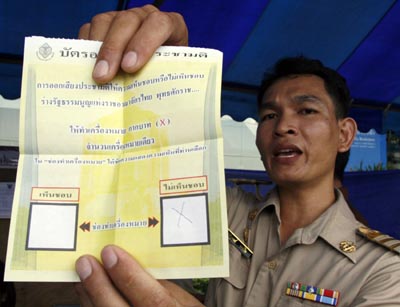Thais approve new constitution, post-coup reconciliation still incomplete
Updated: 2007-08-20 15:49
BANGKOK, Thailand -- Thailand was expected to hold general elections in December after voters approved the country's 18th constitution in a referendum that also showed the lingering influence of ousted Prime Minister Thaksin Shinawatra.
 A district officer counts votes after a national referendum closed at a polling station in Bangkok August 19, 2007. [Reuters] |
Buoyed by prospects of greater political stability, Thailand's main stock market index shot up by 2.6 percent in early trading with analysts seeing prospects for further gains in coming days.
But the vote showed the country remains largely divided between Bangkok residents, who staged months of protests calling for Thaksin to step down, and those in the poor, rural northeastern provinces where support for the former prime minister runs high.
Thaksin was overthrown by the military in a bloodless coup last September. His opponents had accused the billionaire businessman of corruption and abuse of power, while his supporters said the coup was a move by the urban elite to restore influence lost to the rural majority under Thaksin.
Nationwide, 57.6 percent of voters approved the draft constitution, compared to 41.1 percent against it, according to the state election commission's final official count.
Nearly 26 million, or 57.6 percent, of the country's eligible voters turned out for the referendum.
Approval of the draft charter was the last necessary step before elections, which the military has promised would be held in December.
The election commission chief Apichart Sukhakanon suggested December 16 for the election but said the commissioners would meet and choose between that date and December 23 and forward their recommendation to the government.
In Thaksin's stronghold in the northeast, only 37 percent of voters approved the draft, with almost 63 percent opposed. In the capital, a strong majority voted in favor of the text.
"The referendum's result shows that the country is still as divided as before," said Thitinan Pongsudhirak, a political scientist at Bangkok's Chulalongkorn University. "The divisiveness is deep-seated and the referendum has done nothing to change it."
The 186-page constitution, which will be the country's 18th since 1932, curbs the role of politicians, gives more power to unelected bodies such as the courts and could perpetuate the behind-the-scenes power the military has wielded in Thailand for decades.
Interim Prime Minister Surayud Chulanont said the referendum was "the first step in moving forward to full democracy" after last year's coup. He said the charter is expected to be enacted by the end of August after it is endorsed by King Bhumibol Adulyadej, and that he hoped an election could be held soon after the monarch's December 5 birthday.
Thailand has been administered since the coup under an interim constitution that keeps the military in control behind the veneer of temporary civilian rule. Democrat Party leader Abhisit Vejjajiva, widely touted as a likely next prime minister, called on Surayud's government to set a "definite time line for elections."
The new charter will serve as a replacement for a 1997 one popularly dubbed "the people's constitution" for the extensive public consultation and debate leading to its adoption.
That version attempted to bring democratic reforms to a system that left political parties beholden to local power brokers with little or no ideological allegiances, a system that led to unstable, short-lived coalition governments.
The new constitution would turn the Senate back into a partly appointed body, change electoral procedures in a manner that weakens political parties and shift several responsibilities from the executive branch to the judiciary.
|
|
|
||
|
||
|
|
|
|